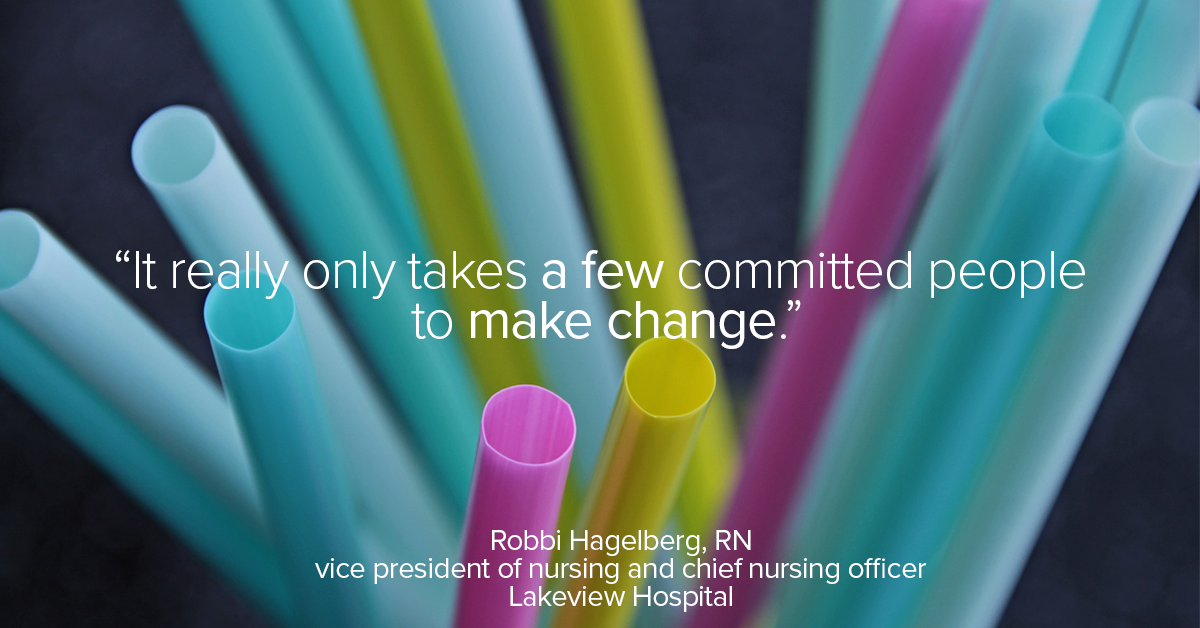Over the past decade, Robbi Hagelberg has developed a growing awareness of how climate change is impacting the health of her family and her community in Stillwater, Minn.
Extreme weather hit her community hard last year with two severe storms in just one week, including hail and wind so strong it pulled up 100-year-old oak trees.
“I have never lived through storms like that before,” she says.
Hagelberg also says her family doesn’t dare venture into the woods on her property from April to August because of an increasing tick population.
It’s these concerns that motivated her to become a Nurse Climate Champion through the Nurses Climate Challenge, a national campaign to mobilize nurses to educate 5,000 health professionals on the impacts of climate change on human health, sponsored by Health Care Without Harm and the Alliance of Nurses for Healthy Environments.
As the vice president of nursing and chief nursing officer at Lakeview Hospital, part of the HealthPartners health system, Hagelberg has used the free tools and resources provided by the challenge to educate more than 100 of her colleagues on the health impacts of climate change and how to take action inside the hospital and in the communities they serve.
Through her work with her hospital’s green team, Hagelberg knows there are many ways to address the large impact hospital operations have on the environment, and she is eager to involve nurses in this work.
It really only takes a few committed people in each department to make change,” she says. “Our infusion department has eliminated straws in their department and are now working on eliminating plastic stirrers for coffee. They are also working on disposing of all waste in an environmental way.”
She says her fellow nurses and other colleagues have thanked her for helping them become aware of the effect climate change is having in their community and how they can respond.
Colleen Groll has been concerned about climate change for many years, but realized the profound environmental impacts of a 24/7 operation when she became a hospital sustainability manager for Seattle Children’s.
“I learned about the large water and energy usage, the waste production, and the complex supply chain operation of a typical hospital,” she says. “It was very exciting to be able to focus my energy on such a great opportunity for change. Hospitals can both decrease their greenhouse gas contributions to climate change, and step up and lead on this issue.”
Groll signed up for the Nurses Climate Challenge because she saw it as an opportunity to bring nurses into a conversation on climate change and children’s health.
“And any way to engage the staff in sustainability is a win,’’ according to Groll. “Much of what I do for our sustainability initiatives is behind the scenes – working to have more efficient building operations, purchase more environmentally preferred products, reducing water through plumbing fixture upgrades. The staff is really involved in reducing waste and optimizing segregation, but they want to be more involved."
"The Nurses Climate Challenge lets them participate in something they hear about on the news every day.”
Groll has given three presentations to groups of hospital nurses and medical assistants using the slides and other materials provided through the challenge. She recommends interspersing the slides provided in the challenge toolkit with your hospital’s own metrics and impacts, as well as the regional climate impacts, which she says can help staff better understand how climate change is impacting their patients locally. Groll says her presentations have generated a lot of interest and enthusiasm.
“Staff want to make a difference and lower their own carbon footprint after seeing the presentation, so I put together a handout on that for participants,” she says.
As a result of her presentations, Groll was also recently invited to be the speaker at Seattle Children’s Neonatal Nursing Grand Rounds in February.
To hear how other nurses are using the free Nurses Climate Challenge tools and resources to support sustainability initiatives and climate solutions in their hospitals, register for the upcoming webinar “How nurses can be hospitals’ climate champions” at 1 p.m. ET Feb. 21.
